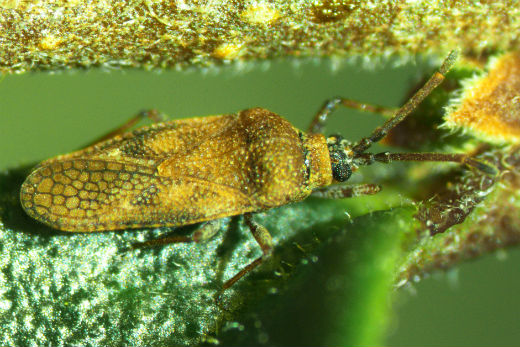Spring hay fever sufferers may have a privet-eating bug to thank in future following their release at a trial site in Bethlehem this week.
And while it will be a few years before the effectiveness of the privet lace bug Leptoypha hospita is known, Bay of Plenty Regional Council Senior Biosecurity Officer Shane Grayling has hailed the trial as potentially beneficial.
The privet eating bug on trial in Bethlehem. Photo: Supplied.
'A lot of people blame privet for their allergic reactions,” says Shane, 'so it's great to have a potential new control option.
'Both the nymphs and adult privet lace bugs feed by piercing and sucking on privet leaves, causing dieback in the branch tips.”
Weather conditions, predator insects and a range of other variables can affect how well a new biological control agent establishes, reproduces and feeds.
'It's only by trialling it in the field that we'll see what situations it can perform best in.
'We won't be distributing the privet lace bug more widely until we've seen how well it works and built up enough stock at the trial sites.”
Landcare Research has developed the bug as a biological control agent for Chinese privet Ligustrum sinense. Developers hope it will also have some spill-over effect into the tree privet Ligustrum lucidum.
Regional Council has supported the development along with other councils under the National Biocontrol Collective.
The bug originates from China and Malaysia, and testing and assessments have been completed to make sure the bug won't threaten native wildlife or agriculture in New Zealand.
Other biological control agents are already being used in New Zealand to help control weeds like St John's wort, ragwort and buddleia.
Improved privet control may not be a magic cure for all allergy sufferers, says Shane. Recent studies by the Auckland Allergy Clinic have found that pollen from grasses, plantain and birch can be greater contributors to allergy problems.
'Another study that explored offensive or irritating scents found that there was little difference between privet and other scents, including jasmine, lavender and honeysuckle, and many people couldn't tell the difference,” says Shane.
'Privet is a weed that we encourage people to control. We can provide advice on effective control methods, but recommend that allergy sufferers seek medical advice and consider what else is growing nearby too.”



2 comments
Oh cummon!
Posted on 09-10-2015 12:18 | By 2cents
Hope it bloody works because in the past, introduced bio problem-solvers often end up becoming the problem ... think cane toads ....
.
Posted on 09-10-2015 13:44 | By whatsinaname
Better control of privet is a chain saw or don't plant it. It's a noxious weed. Get rid of it. don't rely on a bug that could start eating other plants including kiwi fruit.
Leave a Comment
You must be logged in to make a comment.